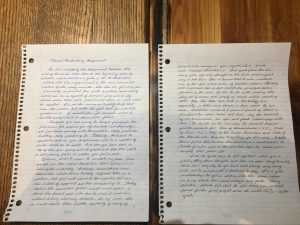Handwritten Document
Posted by gary reimer in Uncategorized

1. Do you normally write by hand or type? Did you find this task difficult or easy? Explain.
I hand record notes in a notebook when reading or listening to a podcast for MET courses. I also make lists and notes to record routine household work. Anything longer than a sentence for any purpose, I would either break up into note form or just keyboard. My English teacher in high school insisted on good penmanship and I still write this way, but meticulous writing requires more concentration and muscle control than a looser more freestyle method might, so I prefer not to do it.
2. What did you do when you made a mistake or wanted to change your writing? How did you edit your work? Did your choice of media play a part in how you edited your work?
I had to resort to whiteout to make changes to the handwritten assignment. I did this on one occasion and then left it to dry and when I came back I couldn’t remember what the word was I had been trying to write so had to pick another one. I also noticed that when I started, I was fresh and energetic and my handwriting was quite legible and clear but by the time I reached the end of the second page it had gotten sloppier. This was because my hand was cramping and also because I had gotten tired of the task and was hurrying to finish. Mechanized writing isn’t affected by psychological and physiological changes in the author so its a more consistent and reliable mode of transmission.
3. What do you feel is the most significant difference between writing by hand and using mechanized forms of writing? Which do you prefer and why?
Editing is definitely the area where handwritten has the most significant drawback. So fundamental are functions like delete, cut-and-paste, and so on that I believe that they have transformed and improved the craft of writing permanently. Engelbart (1963) says that as writing becomes externalized it becomes easier to manipulate and, since writing is a proxy for thought, it makes the thoughts we express more flexible. A habitual hand-writer would no doubt work thorough their ideas more carefully before beginning, but if you are not used to having to do that you wouldn’t make the effort and the result is clearly of lesser quality. Even if you do make the effort, you often think as you write and what you have just written may be a catalyst for entirely original thoughts. These unbidden ideas can be quite valuable and often become a large part of the final text. Mechanized writing, especially word processing, frees the mind from bondage to the page. You can move back and forth almost effortlessly editing your work over and over. Taking an analogy from the arts, handwriting is like sculpting but word processing is like painting
Reference
- Englebart, Douglas. (1963). “A conceptual framework for the augmentation of man’s intellect.” In Hawerton, P.W. and Weeks, D.C. (Eds.), Vistas in information handling, Volume I: The augmentation of man’s intellect by machine. Washington, DC: Spartan Books. Available (as “Augmentation of human intellect: A conceptual framework”)
